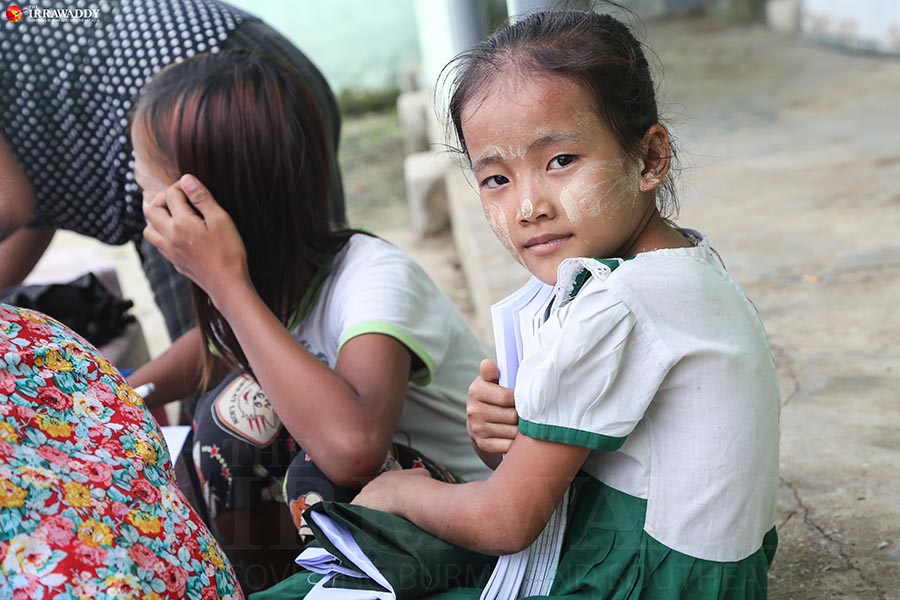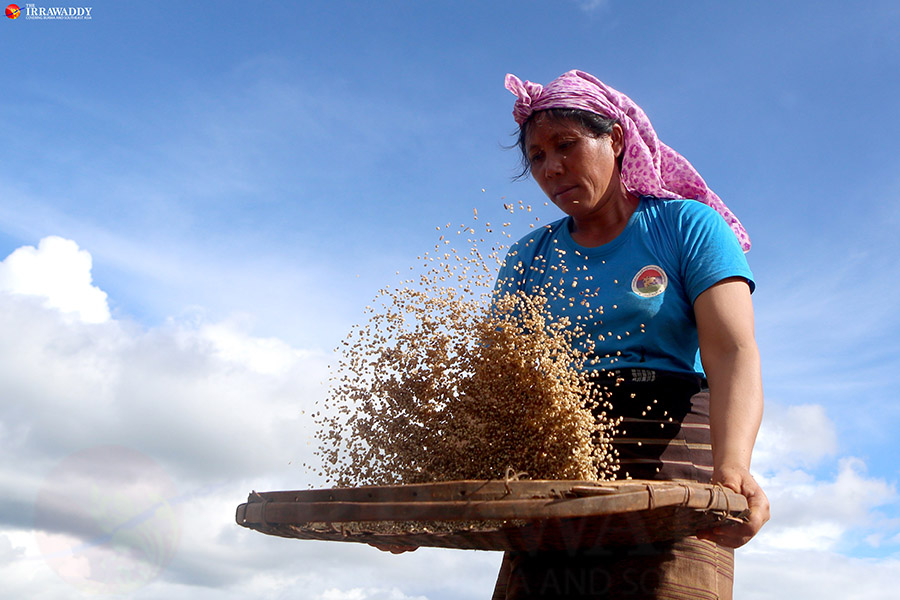YANGON — “Where have all the men gone?” State Counselor Daw Aung San Suu Kyi joked while delivering her keynote address at the Asean Business and Investment Summit in Manila on Sunday.
The speech highlighted women’s contributions to Myanmar’s social and economic development.
“They [men] haven’t come into the civil service; they are not going into academia. They may be going into business, but our women are very strong there too. So I often have to ask this question: Where have all the men gone?” she said, eliciting laughter from the audience.
More and more women entrepreneurs have emerged to participate in Myanmar’s transformation, she said, adding that 49 percent of young entrepreneurs in the country are women.
At Yangon University, 60 percent of students are women, and an increasing number of key faculty posts are going to women, demonstrating that women are playing a growing role in the education sector, she said.
“Our women are putting a great premium on education… This is one of the reasons why we have great hopes for the future of our country, for the future of our young people, who will be encouraged to increase their abilities and their skills by their mothers, their sisters, and their wives,” she said.
But while women had played a remarkable role in recent political and economic changes in many countries, she said, they continue to be denied opportunities in countless areas.
“The social norm that equates women with unskilled labor and perceives them as mere homemakers, incapable of making decisions, is one of our biggest challenges,” she said.
Gender Discrimination in Myanmar
Despite the efforts of numerous women’s rights groups campaigning for gender equality in Myanmar, there are many who don’t believe it is a problem in the country.
Speaking at the summit, Daw Aung San Suu Kyi, the country’s de-facto leader, said, “There are those who say that there is no gender discrimination in our country, but this is not true.”
“It is traditional to look upon men as the superior gender. There is a Burmese saying, which I find somewhat reprehensible, that, “You must treat your son like a lord and your husband like a god.” I don’t think I could agree with that. And I don’t think women can agree either.”
Such a comment from a state leader is exceedingly rare in Myanmar, a country that has been ruled by successive military administrations and ex-generals for nearly six decades.
The military-drafted 2008 Constitution bars Daw Aung San Suu Kyi from becoming president despite her party having won the majority of votes. She currently holds the powerful position of “state counselor,” designated to lead the country, and also holds two ministerial portfolios: foreign affairs and the president’s office.
“There is gender discrimination. It is true we are not discriminated [against] in the sense of being debarred from doing activities such as doing business or going in for various professions. But sill, there is the underlying traditional concept that men are superior,” Daw Aung San Suu Kyi said.
Prominent women’s rights activist Ma May Sabe Phyu said she was surprised to see the extent to which Daw Aung San Suu Kyi addressed gender issues at the summit.
She said that while she appreciated the state counselor’s comments, more commitment and a number of concrete steps were needed from her and the government if practical solutions to gender discrimination problems were to be found.
“As a key decision maker in Myanmar, she has an opportunity to support more women leaders to take roles in leadership and decision-making. And we hope she will be willing to do that,” the activist said.
Under its policy to prioritize women and youth in the elections, the ruling National League for Democracy (NLD) fielded the most female candidates in the 2015 general election with 150. Of those, 134 won seats.
Activists were disappointed, however, when Daw Aung San Suu Kyi herself turned out to be the only woman in the cabinet formed by the NLD to lead the Union Government.
U Sein Win, training director at the Myanmar Journalism Institute, said he has wondered whether Daw Aung San Suu Kyi has faced discrimination from inside or outside her administration for being a woman since she took power.
Certainly, he said, she had been shown disrespect and faced gender-based insults and attacks from opponents on social media.
“As she starts to speaks out about discrimination, I hope this is the first step and that policy changes will follow,” the lecturer said.

Gender Challenges in Education
“There are still many mothers who favor their sons above their daughters, especially when it comes to educational opportunities,” Daw Aung San Suu Kyi said at the summit.
Daw Thandar Oo, founder of the Women and Peace Action Network of Shan State, echoed the state counselor’s statement. She cited a recent survey showing that Shan State has the lowest literacy rate among young women.
“There is still a traditional concept in many ethnic regions that women don’t need to be educated. Also, patriarchal views ensure that even families that can afford to educate their children tend to prioritize sons over daughters,” she said.
Security concerns are another important factor, she said. Many families don’t feel safe sending their daughters long distances to attend school, as conflicts and lawlessness create an insecure environment.
“The more access women have to education, the more they can contribute to their families and communities, and even at the state level. Also, they will have a positive effect on the young generation,” Daw Thandar Oo said.

Women and the Economy
“Traditionally, our women have always been at the forefront of business,” Daw Aung San Suu Kyi told the delegates at the Asean summit.
She was raised, she said, to believe that men went into the civil service for reasons of prestige, while women engaged in business to put food on the table.
“So, we have always depended on women to make sure that the household economy is secure.”
So it should not be such a surprise that 49 percent of Myanmar’s young entrepreneurs are women, Daw Aung San Suu Kyi said.
She was just 2 years old when her father, Myanmar’s late independence hero Gen. Aung San, was assassinated by political rivals in 1947. She later moved to India with her mother Daw Khin Kyi, who was appointed Myanmar’s Ambassador to India and Nepal. Daw Khin Kyi was Myanmar’s first woman ambassador.
“I am also inspired by the millions of women who work each day — holding their heads high in the face of every adversity, saving and sacrificing everything so that their children can enjoy a better life,” Daw Aung San Suu Kyi said.
She added that measures are needed to empower and overcome social constraints, strengthen women’s potential and unleash their economic power to contribute to the nation’s development.
To achieve positive changes in women’s rights, it is important to increase the number of girls enrolling in primary and secondary schools, improve the participation of women in the labor force, ensure better maternal care outcomes, provide social protection measures and promote the role of women in decision-making, she said.
“Our plan is ambitious but achievable. Myanmar is committed to creating an enabling environment for women that will allow them to realize their full potential,” Daw Aung San Suu Kyi pledged.

















